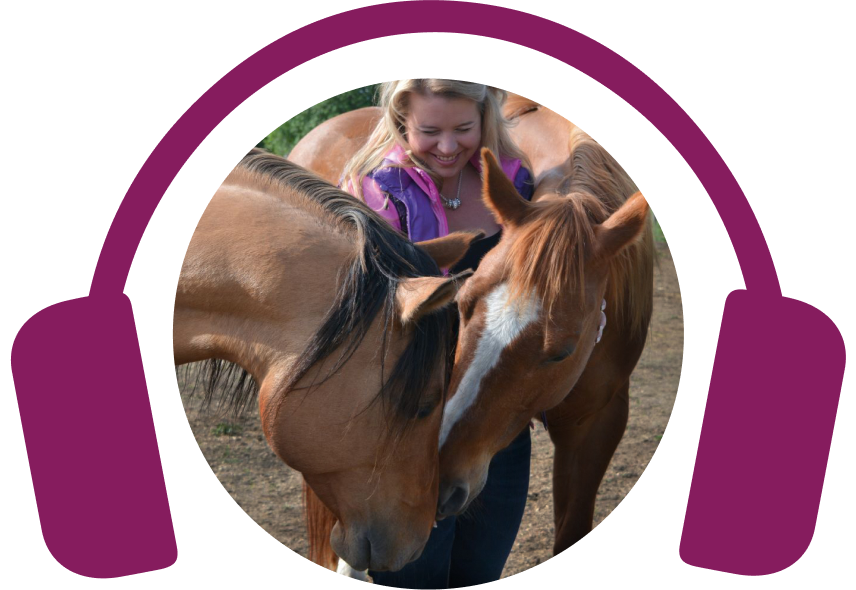Elisha’s Podcast
ELISHA’S PODCAST

Ready to get your horses on the path to better health?
This podcast was created to do just that.
Tune in to get new insights, perspectives, horse health tips, and real-life horse healing stories.
Take what you learn and apply it to your horse TODAY.

One Conversation at a time
From learning what to feed your horse and how to use nutrition effectively, to practicing prevention and approaching specific health challenges naturally, to just bringing your horse more joy and better health…
I’ve got you covered!

Check out my recent episodes
This week, we examine how dopamine affects horses with PPID. There is a significant link between dopamine, diet, lifestyle, nutrition, and the symptoms commonly associated with PPID. So today, I share various lifestyle and nutritional ways horse owners can support dopamine levels in their horses. Dopamine is a neurotransmitter responsible for motor skills, cognitive abilities, and the reward system, so it is vital for physical and mental health. Low dopamine levels in horses can lead to lethargy, depression, and poor concentration. Dopamine plays a significant role in the reward system, and it also controls the overproduction of hormones like ACTH. When dopamine-producing brain cells degenerate, ACTH levels rise, leading to overworked pituitary glands and inflammation. Stress and lifestyle factors can significantly impact dopamine levels in horses with PPID. Dopamine plays a crucial role in mood regulation, motivation, and overall well-being, so when horses are chronically stressed or have frequent inflammation, dopamine levels can drop. By addressing environmental stressors, changing diet, and providing a stable environment, owners can improve the dopamine levels of their horses. Toxic hindgut conditions, often caused by poor diet and lack of movement, can negatively impact the microbiome of horses, leading to lower dopamine and serotonin levels. Unhealthy gut conditions also contribute to metabolic issues and hormonal imbalances, which can complicate health issues. Connection Between Dopamine, ACTH, Cortisol, and Insulin There is a relationship between dopamine, ACTH, cortisol, and insulin levels. Low dopamine leads to higher ACTH and cortisol levels, which increases blood sugar and insulin production. That imbalance is particularly problematic for horses with conditions like laminitis, so early intervention is essential to prevent further deterioration. Managing conditions like PPID requires a holistic approach that focuses on diet, lifestyle, and mental and emotional health. As there is no quick fix for those chronic conditions, consistent management practices are essential for preventing disease progression and supporting horse health. Maintaining dopamine levels through lifestyle changes and reward-based training is crucial. By engaging their horses in learning and activities that stimulate dopamine production, owners can help preserve their brain cell integrity and potentially slow the progression of PPID. Connect with Elisha Edwards on her website Join my email list to be notified about new podcast releases and upcoming webinars. Free Webinar Masterclass: Four Steps to Solving Equine Metabolic Syndrome Naturally Register for Resolving Equine Metabolic Syndrome Naturally, nowThe Role of Dopamine
Dopamine and Its Impact on Hormonal Regulation
Stress and Lifestyle Factors Contributing to Low Dopamine Levels
The Role of Gut Health in Dopamine and Hormonal Balance
The Importance of Comprehensive Management
Final Thoughts on the Role of Dopamine in PPID
Links and resources:
Meet your host
Hi there, I’m Elisha Edwards

Meet your host
Hi there, I’m Elisha Edwards
I have helped guide thousands of horses back to good health over the years from a variety of different health challenges. And through my courses, webinars, and speaking engagements I educate and empower horse owner’s from around the world to take charge of their horse’s health using the holistic model of health care.
So I know first-hand how difficult and overwhelming it can be to navigate all the different opinions and conflicting information that you come across especially when your horse is faced with a health problem. In many cases, the journey is just as hard on the owners as it is on the horses.
I started Healing Horses with Elisha to guide you, support you, and encourage you through the process of prevention and recovery so you feel good about the decisions you’re making for them.
Here’s what I believe
I have seen countless horses with seemingly impossible health conditions that have been resolved so easily with the right combination of diet, nutrition, and natural remedies. In many cases, it is not the health conditions that prevents the horse from recovering, it is the lack of education, resources, and options that are available.
If the insight and information you gain from this podcast gives you some newfound hope or inspires you to take
a new approach then it has served it’s purpose.
Thank you for giving me the opportunity to help you improve your horse’s health.
Keep listening and learning. Your horse is worth it.
Listen Now
Tune in wherever you listen to your podcasts and follow me so you never miss an episode. I release a new one every Tuesday!

Leave a Review
Reviews help me reach more horses and also help me deliver more relevant content to you!

What my Listeners are saying
“Every time I think there is no way to top what you do – you elevate us to yet another level. I wish I had a fraction of your communication skills. You’re amazing and I am so grateful to be apart of the magic you are creating for horses and their humans.”
Tracey
“Your podcasts are fantastic! I get so excited to listen to the next one. I have 6 geriatric horses and your podcast has really opened my mind to new possibilities in their health and given me the strength to help them through hiccups in their well-being the past few months. I have a nursing education and you explain pathology better than my university professors.”
Sharon
“I can’t thank you enough for the Mindset Tips podcast. I really needed this reminder. It was just what I needed to hear to today.”



